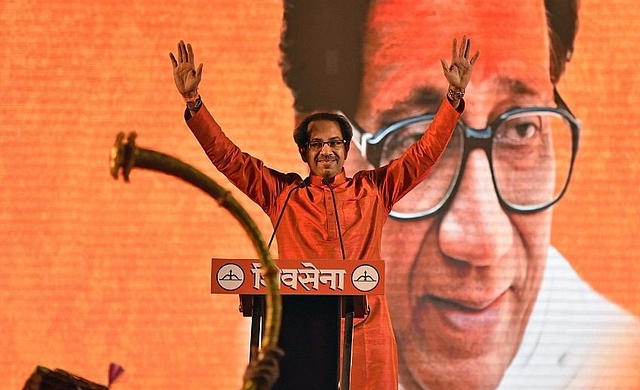
Shiv Sena On Road To Irrelevance: It’s Posture On BJP President Nominee Makes No Sense
By defining itself as anti-whatever-the-BJP-stands-for, the Sena is on the same self-destructive course as Pakistan. Destruction of India gives Pakistan greater pleasure than building itself.
Does Uddhav Thackeray want to fall into the same self-defeating trap?
The Bharatiya Janata Party’s (BJP) decision to field Ram Nath Kovind as the National Democratic Alliance’s presidential nominee is seen as a masterstroke only because he happens to be a Dalit against whom the opposition will find it difficult to field a convincing nominee. Kovind is sure to win, given the backing of many regional parties from the south and east, including All India Anna Dravida Munnetra Kazhagam, the YSR Congress, the Telangana Rashtra Samiti, and the Biju Janata Dal.
However, the real gain for the BJP is that it has shown up its own ally, the Shiv Sena, as unprincipled and obstructive. After repeatedly trying to queer the pitch for the BJP by suggesting the names of Rashtriya Swayamsevak Sangh chief Mohan Bhagwat and then M S Swaminathan, the Sena is now bleating its opposition to Kovind claiming it is about pandering to vote bank politics.
The Sena needs to grow up. One can understand its anxieties, for it faces an existential crisis in Maharashtra as the BJP is steadily eating its lunch. There is now a near total overlap between the two parties’ constituencies – with the solitary exception of the Sena claiming to represent the “Marathi manoos” in urban areas. But Chief Minister Devendra Fadnavis has undercut the Sena even here, with his bold gambit of taking Shivaji away from being only a Sena mascot. He is building a giant statue of this iconic Maratha warrior by creating an artificial island off the southern tip of Mumbai. For the BJP, appropriating Shivaji was a logical extension of its Hindutva card since Shivaji cocked a snook at the Mughal empire and his successors created a pan-India empire.
The Sena’s real problem is that it has no issues beyond opposition to what the BJP stands for. Its stand on any issue – and not just the presidency – is often about positioning itself as different from the BJP. While differentiation is a valid way to build a brand, in the Sena’s case this differentiation is not built on a believable proposition. The Sena has no traction among farmers, but it suddenly became shrill on farm loan waivers. In the one area where it can make a mark, it is doing nothing: it has almost no sensible position on the travails of Mumbai, which is sinking under the weight of the Sena’s own maladministration.
The Sena’s political future lies in Mumbai, Thane and the smaller municipalities surrounding this megalopolis. But its core constituency of the Marathi manoos is shrinking in the capital as it continues to attract migrants from every state. Many migrants are from the Hindi belt, where the BJP is strong, and the latter party, under Narendra Modi and Amit Shah, has now reached out from this position of relative strength to claim to represent the Marathi manoos too.
If the Sena has to survive as a real power in the state, it has to reinvent, and the only position available to it is as a truly urban party. This was the position the Aam Aadmi Party should have taken, for India is already 32 per cent urban, and over the next two decades, it could be nearly 50 per cent urban. The farmers’ clout will come down steadily in the coming decades, and the future belongs to urban parties.
But the Sena has the most illogical position on Mumbai. The world over, big metros are drivers of growth and innovation, but this can happen only if cities are run like corporations, and sectarian demands are eschewed. The Marathi manoos stance of the Sena is in direct conflict with its power base. Little wonder, the BJP, as a pan-Indian party, finds more appeal in Maharashtra’s urban areas. In the last municipal polls, the BJP won almost all the major cities barring Thane and Mumbai, and even in Mumbai it came just a whisker below the Sena. The Sena got 84 to BJP’s 82 seats.
The BJP is widening its base by expanding the issues it espouses and inviting strongmen from other parties to join it while the Sena is shrinking its base by making demands irrelevant to any constituency. Political fortunes are not built by pursuing ego-trips.
To repeat: if the Sena wants to regain some electoral traction, it should define itself as an urban party, the party of modernity and growth. It can then force the BJP to choose between representing powerful rural interests, and urban middle-class votes. A greater complementarity of voter bases can then develop again.
Instead, by defining itself as anti-whatever-the-BJP-stands-for, the Sena is on the same self-destructive course as Pakistan. Pakistan defines itself as “not India”. It has no positive self-definition. Destruction of India gives Pakistan greater pleasure than building itself. It is a loser. Does Uddhav Thackeray want to fall into the same self-defeating trap?